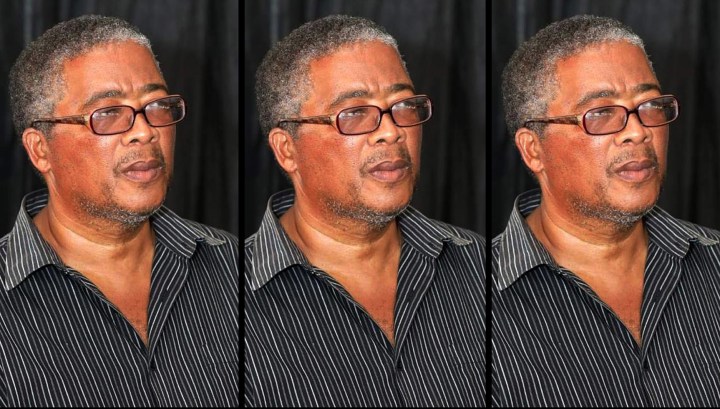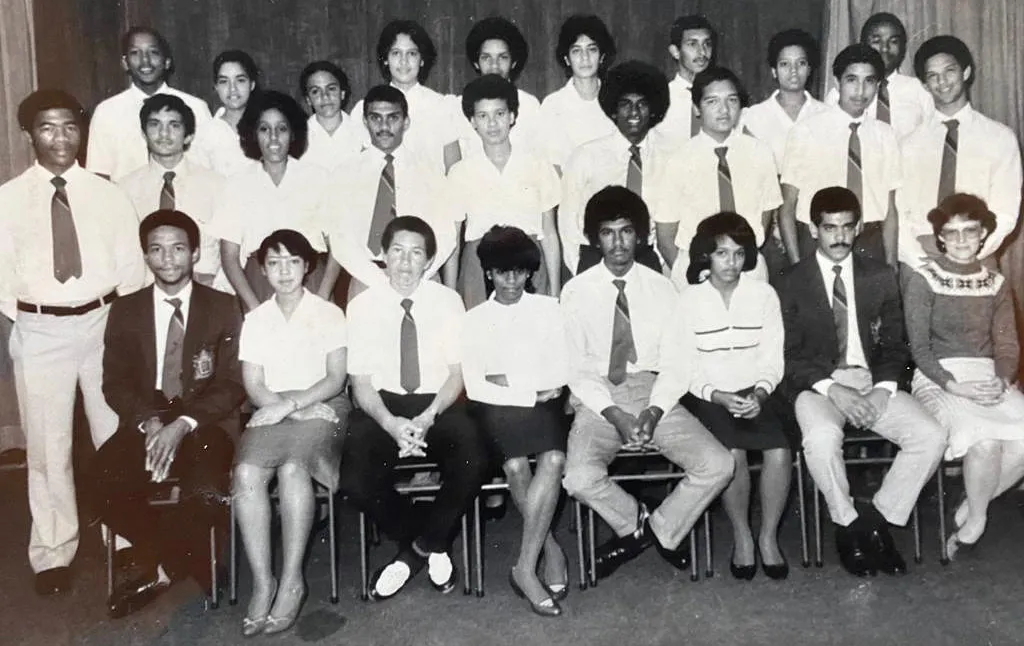TRIBUTE
Remembering Gordon Webster, one of our most unlikely and modest freedom fighters

Despite his innate modesty and desire for anonymity, Gordon Webster, who has died at the age of 58, was at the centre of several hugely dramatic episodes in the 1980s when he commanded an Umkhonto weSizwe unit which carried out a series of sensational propaganda bombings in the Durban area.
Sometimes those most deserving of our attention, never having sought the limelight, simply seem to slip away from us, modest and unassuming even in their final passing, just as they had always been in life. So it was with Gordon Webster, one of the most remarkable and unlikely of MK freedom fighters, who has died at the age of 58.

Gordon Webster with Robert Mc Bride, 2015/16. (Photo: Supplied)
A quiet, thoughtful and extremely gentle soul, Gordon was the most unlikely of combatants. As a young trainee teacher in Durban, barely in his twenties, he should never have had to pick up a gun in the Struggle for liberation. He was, however, all the more remarkable for having done so, and should be honoured today precisely because he took up arms without ever asking for, or expecting, anything in return for his outstanding bravery and considerable sacrifice.
Despite his innate modesty and desire for anonymity, Gordon was at the centre of several hugely dramatic episodes in the 1980s when he commanded an Umkhonto weSizwe unit which carried out a series of sensational propaganda bombings in the Durban area.
Having survived an almost fatal shootout with security police, then being freed from hospital in a famous raid by his comrade, Robert McBride, and later being sentenced to 25 years on Robben Island, two weeks ago Gordon and his wife of many years became victims of South Africa’s road carnage. Anne died almost immediately and earlier this week Gordon was taken off life support.
Gordon and Anne Webster leave four adult children in their twenties and thirties.
“On his own, Gordon made such an impact,” Robert recalled this week. “As our commander, he taught us everything we knew. He was completely selfless and from the very beginning he never expected any acclaim, nor did he ever ask for anything in return later on.”
Typically, as a student teacher in Durban, Gordon simply vanished one day without telling his family in order not to compromise them. He went into exile for military training and many months later, just as surreptitiously, he suddenly reappeared in Durban – and immediately recruited his close friend Robert into the underground Struggle.
Daring plans
Gordon’s tight-knit unit began a series of sensational propaganda bombings at a time when the ANC seemed almost dormant in the area. One night Gordon and his comrade, Bheki Ngubane, were stopped on a lonely road by the police. They were carrying armaments in the boot of their car.
Bheki was shot dead and Gordon was almost fatally wounded. He was kept under heavy armed guard in the Intensive Care Unit of Edendale Hospital near Pietermaritzburg. The apartheid regime made a huge fuss about capturing “a dangerous terrorist”.
Famously, Robert and his father Derrick organised a daring raid to free their wounded comrade. Dressed as doctors, with AK-47s hidden up their sleeves, the McBrides entered the hospital at night, climbing the stairs to the ICU where Gordon lay naked and attached to several drips and tubes.

Picture was taken 1983 before Gordon Webster, left centre row and Robert Mc Bride right centre row, joined MK. (Photo: Supplied)
Following a shootout in the corridor, the McBrides ripped out all the tubes and placed Gordon on a trolley. Racing down the concrete stairs, the wounded man fell heavily several times. As they exited the hospital, nurses and patients crowded to the windows, singing encouragement as they made a fast getaway.
After several weeks recuperating in secret, Robert smuggled his friend to Botswana and despite receiving medical treatment abroad, doctors were unable to remove several bullets from Gordon’s body as they were too close to the spine and heart. Later, after Robert had been sentenced to death for the 1986 bombing of beachfront pubs in Durban, Gordon desperately sought permission from the MK command in exile to return to South Africa and repay the debt to his friend, with a plan to kidnap the trial judge in return for Robert’s freedom.
Eventually Chris Hani authorised this audacious plan, but Gordon was arrested almost immediately on his return. This episode is indicative of Gordon’s extraordinary bravery and steadfast loyalty. He was sentenced to 25 years in prison, and it was on Robben Island in 1990 that I interviewed him in preparation for a book about his and Robert’s exploits. I was struck at the time by Gordon’s gentleness, directness and honesty in answering all questions – and, remarked on by all who knew him, his sense of humour.
After 1994, Gordon was offered a senior position in the South African National Defence Force, which he turned down. As he told me at the time: “I never want to be told by anyone ever again what to do, or take orders from anyone.”
Read more tributes in Daily Maverick:
“Don Mattera’s voice has been stilled, but his powerful words linger on in memory”
“Politicians, civil society pay tribute to Jessie Duarte’s life”
“A giant and a father to all: Remembering and paying tribute to Dr Max Coleman”
Instead, he largely vanished from sight, conducting a series of small ventures in the Port St Johns area, including a modest chicken business. He was so private that even some members of his own family found it difficult to track him down. But as his niece, Ruth, once remarked to me: “I think Gordon is a very happy man.”
That is how we should remember him, now that Gordon has once again slipped away from us unobtrusively: a modest and a very private man who never sought recognition or honours, but who quietly fought the good fight for its own sake with steadfast courage, loyalty and total conviction. DM
Bryan Rostron has worked as a journalist in Italy, New York, London and South Africa, writing for Business Day, Daily Maverick, The New York Times, The Guardian, The Spectator, and Private Eye. He was the South African correspondent for the New Statesman and is the author of six books including Robert McBride: The struggle continues, The Ranter’s Guide to South Africa and a novel, Black Petals.



















 Become an Insider
Become an Insider
Comments - Please login in order to comment.